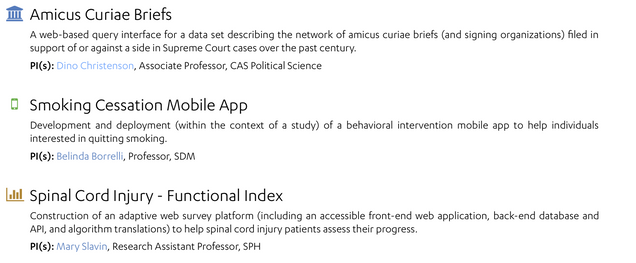SAIL Continues to Grow and Support New Research
 The Software & Application Innovation Lab (SAIL) at the Hariri Institute for Computing is a professional software design and development lab that serves as a collaborative resource for computational and data-driven research efforts across Boston University. Recognizing that both the quality and potential impact of research are increasingly dependent on the development of high-grade software artifacts, the Institute launched SAIL to provide researchers with professional software development capacity in support of projects that require cutting-edge software artifacts and solutions.
The Software & Application Innovation Lab (SAIL) at the Hariri Institute for Computing is a professional software design and development lab that serves as a collaborative resource for computational and data-driven research efforts across Boston University. Recognizing that both the quality and potential impact of research are increasingly dependent on the development of high-grade software artifacts, the Institute launched SAIL to provide researchers with professional software development capacity in support of projects that require cutting-edge software artifacts and solutions.
SAIL’s success over the past year and a half has been remarkable, with accomplishments including the completion of 22 software and application development projects with over $350K of funding, reflecting collaborations with more than 60 faculty members from across 12 schools and 23 departments. The SAIL team employs a unique approach to working with faculty, functioning as a close collaborator while offering customized service and rapid software deployment. Working with faculty on both the Charles River and Medical campuses, SAIL looks to learn and improve with each project the team takes on. As SAIL Director, Andrei Lapets, notes, “we might look at something and say, we don’t actually know the technology for this project, but we know that we can learn it, because that’s the culture we cultivate in SAIL.”

Supported projects focus on a wide range of topics and technologies, from using natural language processing to analyze large literature corpora, to solving record linkage problems for public health and economics applications, to building mobile applications for medical studies, to building smart-city services and platforms. Additionally, SAIL engages with the BU research community through various outreach and research development efforts, including its organization of an annual SAIL expo event and its participation in research development activities such as the Digital Humanities Seminar and the Biomedical Research pre-ARCs on the Medical Campus. Kaija Schilde, acting director of the Pardee School Initiative on Forced Migration and Human Trafficking, commended the team for being “accessible and friendly, yet analytically tough and challenging” during a recent workshop SAIL supported.

Since launching in 2014 with just Lapets and Senior Software Engineer, Frederick Jansen, SAIL has exploded on the scene, bringing in three additional software engineers and a project analyst as well as developing a robust internship program. In high-demand, the program offers unique opportunities for BU students to gain real world experience through three different internship tracks for software engineer interns, UI/UX design interns, and graphic design interns. To date, SAIL has employed 27 student interns. SAIL intern, Aditi Dass (CAS ’17) notes that her internship has allowed her to bridge interests in “analytics, research, and startups” – something that’s often hard to find in traditional internship experiences.
 This spring, the internship recruitment process saw a 300% increase in applications from fall 2016, and has expanded to a larger team than in previous semesters. The new interns kicked off their semester on Monday, January 23rd with a full team meeting and orientation event. The spring 2017 SAIL interns are: Raphael Baysa (CAS’17), Linlan Chen (GRS’17), Chang Gao (CAS’17), Ben Getchell (CGS’09, CAS’11, GRS’17), Sreeja Keesara (CAS’19), Rudhra Raveendran (CAS’20), Ibrahim Shaikh (CGS’19), Ryan Walsh (CAS’17), David Wang (CAS’17), and Jacqueline You (CAS’16, MED’20). All of the interns will be working with SAIL software engineers and faculty collaborators on a number of ongoing research software development projects.
This spring, the internship recruitment process saw a 300% increase in applications from fall 2016, and has expanded to a larger team than in previous semesters. The new interns kicked off their semester on Monday, January 23rd with a full team meeting and orientation event. The spring 2017 SAIL interns are: Raphael Baysa (CAS’17), Linlan Chen (GRS’17), Chang Gao (CAS’17), Ben Getchell (CGS’09, CAS’11, GRS’17), Sreeja Keesara (CAS’19), Rudhra Raveendran (CAS’20), Ibrahim Shaikh (CGS’19), Ryan Walsh (CAS’17), David Wang (CAS’17), and Jacqueline You (CAS’16, MED’20). All of the interns will be working with SAIL software engineers and faculty collaborators on a number of ongoing research software development projects.
SAIL is a unique resource that enables researchers to innovate using data and computational sciences. The team’s successful engagement with the BU community so far demonstrates the demand for such a resource, from the School of Medicine, to the Digital Humanities Initiative and beyond.
If you’re interested in learning more, please visit SAIL’s new website, or contact Andrei Lapets, Director of Research for the Hariri Institute for Computing and Director of SAIL, at lapets@bu.edu.